EDITED BY CHARLS CHAP, JUXTAPOSING LAURE'S DREAM WITH HER REALITY
 Hello and welcome to the unofficial Brian De Palma website. Here is the latest news: |
|---|
E-mail
Geoffsongs@aol.com
-------------
Recent Headlines
a la Mod:
Listen to
Donaggio's full score
for Domino online
De Palma/Lehman
rapport at work
in Snakes
De Palma/Lehman
next novel is Terry
De Palma developing
Catch And Kill,
"a horror movie
based on real things
that have happened
in the news"
Supercut video
of De Palma's films
edited by Carl Rodrigue
Washington Post
review of Keesey book
-------------
Exclusive Passion
Interviews:
Brian De Palma
Karoline Herfurth
Leila Rozario
------------
------------
| « | September 2018 | » | ||||
| S | M | T | W | T | F | S |
| 1 | ||||||
| 2 | 3 | 4 | 5 | 6 | 7 | 8 |
| 9 | 10 | 11 | 12 | 13 | 14 | 15 |
| 16 | 17 | 18 | 19 | 20 | 21 | 22 |
| 23 | 24 | 25 | 26 | 27 | 28 | 29 |
| 30 | ||||||
De Palma interviewed
in Paris 2002
De Palma discusses
The Black Dahlia 2006

Enthusiasms...
Alfred Hitchcock
The Master Of Suspense
Sergio Leone
and the Infield
Fly Rule
The Filmmaker Who
Came In From The Cold
Jim Emerson on
Greetings & Hi, Mom!
Scarface: Make Way
For The Bad Guy
Deborah Shelton
Official Web Site
Welcome to the
Offices of Death Records
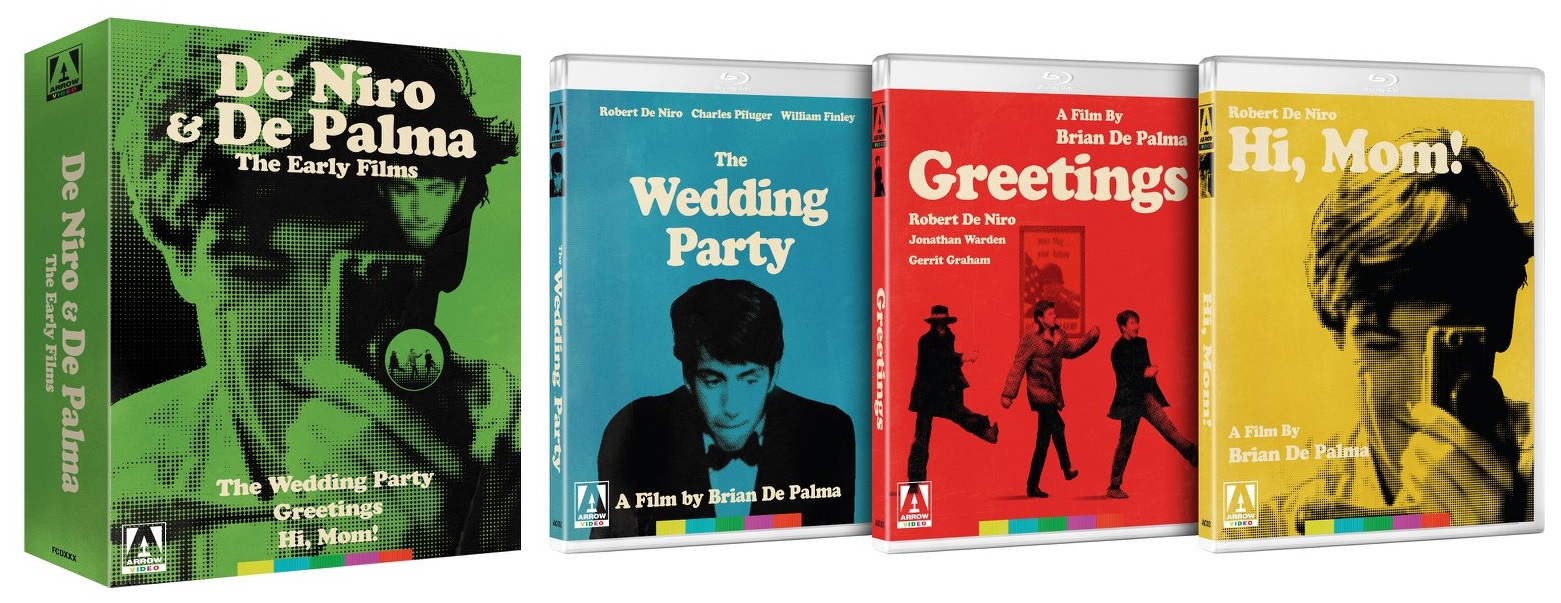
NEW UK/US/CA TITLE: De Palma & De Niro: The Early Films (Blu-ray)Brought together for the first time – and each newly restored – these three films offer a fascinating insight into the early careers of two American cinema’s major talents.
... Release dates: 12/13 November
In 1963, Robert De Niro stepped in front of a movie camera for the first time. The resulting film, a low-budget black and white comedy called The Wedding Party, would take three years to complete, and another three years to be released, but it would also establish a hugely important working relationship for the aspiring actor. One of the filmmakers, long before he became synonymous with suspense thanks to Carrie, Dressed to Kill and other classics, was Brian De Palma. He and De Niro would team up again in the next few years for two more comedies, both with a countercultural bent.
Greetings, the first film to receive an X certificate in the United States, is a freewheeling satire focusing on a trio of twentysomething friends – a conspiracy theorist, a filmmaker, and a voyeur played by De Niro – as they try to avoid the Vietnam War draft. Hi, Mom!, originally named Son of Greetings, returns to De Niro’s voyeur, now an aspiring maker of adult films, for another humorous glimpse at late-sixties society, this time turning its attentions to experimental theatre, cinéma vérité, the African American experience, and the white middle classes.
Brought together for the first time – and each newly restored by Arrow Films especially for this release – these three films offer a fascinating insight into the early careers of two American cinema’s major talents.
LIMITED EDITION CONTENTS
• Brand new 2K restoration of The Wedding Party from the original film negative, carried out exclusively for this release by Arrow Films
• Brand new 2K restorations of Greetings and Hi, Mom! from original film materials, carried out exclusively for this release by Arrow Films
• Original uncompressed mono soundtracks
• Optional English subtitles for the deaf and hard of hearing on all three films
• Brand new commentary on Greetings by Glenn Kenny, author of Robert De Niro: Anatomy of an Actor
• Brand new appreciation of Brian De Palma and Robert De Niro’s collaborations by critic and filmmaker Howard S. Berger
• Brand new interviews with Charles Hirsch, writer-producer of Greetings and Hi, Mom!
• Brand new interview with actor Gerrit Graham on Greetings, Hi, Mom! and his other collaborations with Brian De Palma
• Brand new interview with actor Peter Maloney on Hi, Mom!
• Hi, Mom! theatrical trailer
• Newly commissioned artwork by Matthew Griffin
• Limited collector’s edition booklet featuring new writing on the films by Brad Stevens, Chris Dumas and Christina Newland, plus an archive interview with Brian De Palma and Charles Hirsch
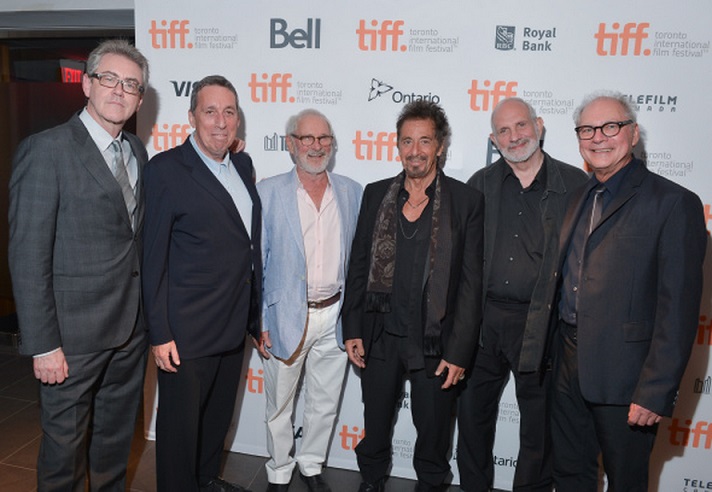
You say that Weinstein changed the game for festivals. When the allegations came out against him last year, did it cause you to re-examine TIFF’s dealings with Weinstein? How close were you with him and his company?We were negotiating with him every year, as we did with every other single North American distributor and studio. We obviously in no way condone any of what happened, and we were the first festival to come out in support of the women who came forward. You have no sense of what’s going on in your festival behind closed doors and in hotel rooms. But we’ve tightened up and we’ve always had a sexual harassment policy in place, which we’re going to make more public. There will be a hotline to call, signage, a code of conduct. We take it very seriously.
Did the allegations shock you? There was always talk about him being a bully, certainly ...
That’s a tough question to ask because is there any behaviour that surprises me at the end of the day? You’re in the movie business. Go back to the old Hollywood studio bosses – read Marilyn Monroe’s memoirs for Christ’s sake. The casting couch syndrome goes back to theatre. Does it come as a surprise that there are people still continuing that bad behaviour? No. Does it come as a surprise that that’s the person? Yes. It’s something you wish would go away, and I have no idea if at the end of the day it will. I know the #MeToo movement is going to make great inroads, and all of us are clamping down. But it’s going to take more than one year, two years, to change the industry.
What do you think of Brian De Palma’s plans to make a Weinstein-inspired horror movie set during TIFF?
[Laughs] Well, Brian’s made a movie set in Cannes, and Harvey was here all the time … I’m not going to have to deal with the issue in my position as CEO, someone else will. Whether the film gets made or not, who knows? I was amused by it. I read that and thought, “That’s Brian being outrageous.”
Were you ever tempted to go elsewhere?
I was approached, but you’re running the most important, biggest festival in the world. Some approaches were to run institutions where I’d be an administrator, and I didn’t want to be an administrator raising money. I wanted to be the film guy who had the luxury and opportunity to run an institution with people around me who could do most of that work, exceptional fundraisers who know their business. This is one of the best film jobs in the world, and it’s allowed me to dream my own dreams.
Hi, I'm one of the producers on the film, and I've been dealing with the legal issues with Brian for a very long time. I think... what has to be understood here, is that, first of all, Brian absolutely tried to indemnify Magnolia, and Mark [Cuban] and Todd [Wagner]. So did myself and the other producers of the film. We were willing to put ourselves on the line to actually get the unredacted pictures out there. But that is not legally acceptable. That doesn't mean that people can't go after Cuban and Wagner, and the people who financed the film. And ultimately, it's their decision whether or not they want to take that risk. What I think is really horrible here, and, you know, what is becoming in the press, a sort of "Cuban vs. De Palma" type of silly debate, is that, E&O insurance, since 9/11, errors and omissions insurance, has become incredibly difficult to get for American films. And the Fair Use laws in America are completely unfair. And they set it up so that we cannot use images of our own culture to tell the truth about our own culture. And that is a restriction that occurs to documentaries that are out there, as well as feature films, and this is a much larger issue.

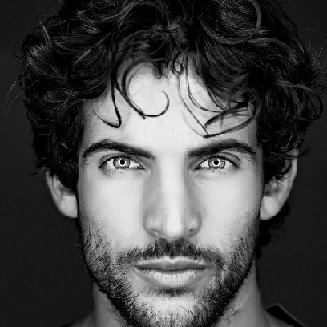 Mari Paz Díaz at Huelva Buenas Noticias posted an interview today with Madrid-based actor Cristian Gamero, who worked for a few days last year filming Brian De Palma's Domino. Since then, Gamero has been working on a Netflix/Telemundo series in Mexico (Luis Miguel: la serie), where he has been gaining some recognition. He talks a bit about Domino in the early part of today's interview:
Mari Paz Díaz at Huelva Buenas Noticias posted an interview today with Madrid-based actor Cristian Gamero, who worked for a few days last year filming Brian De Palma's Domino. Since then, Gamero has been working on a Netflix/Telemundo series in Mexico (Luis Miguel: la serie), where he has been gaining some recognition. He talks a bit about Domino in the early part of today's interview:-Cristian, why did you choose acting?
-When I was a kid, I always locked myself in the room and, for hours, imitated the actors in the movies. I didn't know why, but I enjoyed it very much. Then, when I took my first acting class, I felt it was what I wanted to dedicate my whole life to.-What have been your first jobs as an actor?
-The first job opportunity was in the series 'The Ministry of Time'. Then I shot two films, 'Domino', the latest film by Brian De Palma, and 'Sin ti', by the Alenda brothers, with Javier Rey and María León. And, last year, I started working in Mexico on the 'Luis Miguel' series of Netflix. And very happy.- How did it feel working with Brian De Palma?
-It was the best experience of my life. I came across a casting that I did not expect at all. It was an incredible shoot and very special days for me. The action scene I had to do was complicated. We needed a specialist. When we finished, Brian De Palma told us that he was very happy with how the scene turned out, given that he was very worried about the little time he had. It was night and there were a lot of extras, not to mention the difficulty involved. So we had to solve it with few takes. And we got it. Therefore, the director congratulated us.
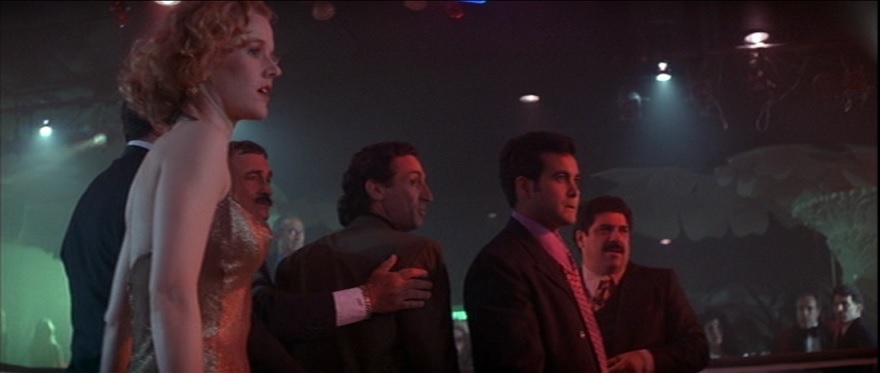
Spring 1993. My mother was in the hospital in grave health. I got a call to get up to the city to meet Brian DePalma, he wanted to see me and Cousin Vin for a scene to be shot at the Copacabana with Pacino and Penn. Well I went and so did Vin and the rest is history. Yeah it was a small scene, but all things considered a very memorable one! “Hey you! Yeah you spaghetti dick!” Amazing performances by Penn and Pacino.trajectoryfilmsMy late cousin Greg played the guy that dances with Penelope Ann Miller in that scene.
trajectoryfilmsThat’s Greg on the left. He passed away about 15 yrs ago while doing a play at the Kennedy Center.
mafiachroniclesEpic! 🙌🏼
garry_pastore@trajectoryfilms oh damn I didn’t know he passed away. Great guy I remember him well. We were held captive in the Copa together for days. My sincerest condolences my friend
In a span of four years from 1989 to 1993, Pastore (then known as Garry Blackwood) appeared in movies by De Palma, Spike Lee (Do The Right Thing), Martin Scorsese (Goodfellas), and Robert De Niro (A Bronx Tale). Currently appearing on HBO's series The Deuce, Pastore will also be seen next year alongside Pacino and De Niro in Scorsese's The Irishman.
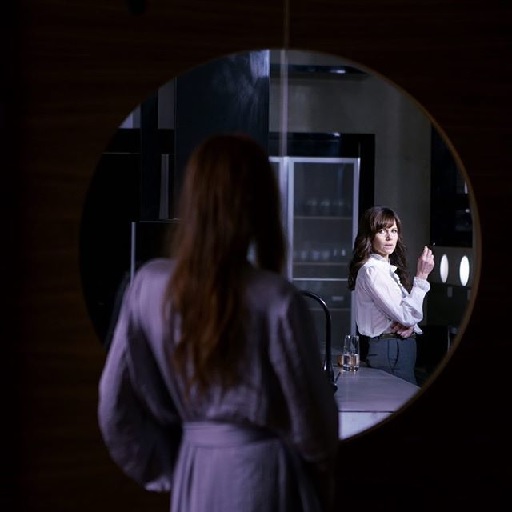 Sebastian Gutierrez's Elizabeth Harvest was released a couple of weeks ago, and is described by MovieMaker's Grant Vance as a "trippy, colorful genre mashup." Gutierrez tells Vance that he set out to make a movie that would be more visually-oriented and less dialogue-driven than his previous films:
Sebastian Gutierrez's Elizabeth Harvest was released a couple of weeks ago, and is described by MovieMaker's Grant Vance as a "trippy, colorful genre mashup." Gutierrez tells Vance that he set out to make a movie that would be more visually-oriented and less dialogue-driven than his previous films:Grant Vance, MovieMaker Magazine: One of my Favorite aspects of Elizabeth Harvest was your handle of the atmosphere and tone. How do you develop and maintain that atmospheric tone as a writer and director when dealing with something so genre-oriented?Sebastian Gutierrez: The last four movies that I directed were so small I hardly have a set. I had actors, and I had to rely on dialogue. I made very character-driven films. So it became really important for me that the next movie I made, even if I didn’t have a big budget, would have camera moves, and sound and music put together. The story of Elizabeth Harvest was written with that in mind. The script has a lot less dialogue than stuff that I usually write.
I wanted to use tools that people like Hitchcock and De Palma and Kubrick use; have the camera to creep down corridors. Really creating that claustrophobic feel of being trapped inside a house was something the director of photography and I shot listed for very specifically. A lot of it is about a house that is set up for Elizabeth to look around and lose herself in. It was very important that we used the colors that we were concentrating on to make it all feel like a dream inside her mind that she’s moving through.
MM: Could you elaborate on the specifics? For instance, were your canted angles, vibrant colors and off-kilter framing all conceived within the script writing process?
SG: The color coding came about early on. Elizabeth Harvest is written so that every 20 minutes something switches in the story. This is opposed to a traditional three act structure. It’s basically a Russian doll structure of story inside a story inside a story. There’s a lot of time stuck in the past and I wanted it to feel less like a logical leap that you had to take and more like a visceral thing that you felt.
We decided that these very saturated colors—red, blue, green, and yellow—would represent different things in each of those scenes from the past. Not really what everyone represents exactly, but they were then parallel with the present day scene that had to do with that emotion with cyan and amber. It was a really good way for the actors and the director of photography and the production designer and myself to find our way through the story. Not to mention that it’s fun to play with really bold saturated colors.
MM: Can you touch on the idea of interloping different genres within Elizabeth Harvest? Jumping naturally from arthouse sci-fi to classic horror.
SG: From the very beginning I wanted to not make a horror movie. I love horror movies, I just didn’t want to only make a horror movie. The horror in Elizabeth Harvest is something much closer to European horror from the 60s and 70s. I’ve been making movies in this country for awhile, but i’m Venezuelan. My sensibilities have always been as a foreign filmmaker; very highly stylized and visual. That sort of Euro-horror that goes from the very cheap and clunky to the very arthouse sort of poetic horror like Eyes Without a Face are things that I’ve always really loved. The Blue Beard story is the bones of the story. It’s a very classic gothic love story, but this movie happens to be science fiction. I needed that to deal with [Elizabeth] differently than [her parallel] in the original Blue Beard story.
The notion of mixing genres is simply that it’s very hard to do a movie that’s just one genre in the post-modern world. The hard part is grabbing things from different genres and understanding that there’s a portion of the audience that won’t like you subverting those rules. There’s a version of this movie that’s straight up horror—which isn’t a bad notion—but it’s much less interested in developing how these characters ended up here. Everyone knows exactly what happens in this story. When someone says “Go everywhere except the one room!” I wanted to get that out of the way immediatly.
MM: Does the Blue Beard influence mingle with an other direct story references? I was sensing a sadistic God complex in Henry viewing Elizabeth as his Eve, in a sense.
SG: There’s a sub genre of mad scientist movies that I love that are usually less concerned with the mad scientist setting out to be god. They’re more interested in the mad scientists doing the wrong thing for love. It’s like Hitchcock would say: “I’m not interested in who done it. I’m interested in what done it.”
MM: I really enjoyed the utilization of split screen; an editing technique with a post-modern sensibility. From a directorial standpoint what are the advantages of using this editing style?
SG: One was for practical purposes, since the audience has already seen this. The second suspenseful one came out of wanting to take a crack at that and have fun with it. Split screens are something that I’ve always wanted to do. Brian De Palma is an absolute master at them, especially in the great, great greta, film Sisters. People like John Frankenheimer. Filmmakers used them awhile back in the 60s and 70s and then people kind of stopped.
Both of those split screen scenes in the movie were in the script, but they’re different once you’re shooting them. Your mind doesn’t work that way. The funny thing with split screen is that you can’t see everything at the same time, so you’re making connections to be able to leap from one thing to another. It’s a bit of a trap to make it make perfect sense. And that’s what I like it about it. It works on a purely visceral level and it can really add suspense. It’s a stylized if you marry it to the right kind of music. You can feel that giddiness. That’s my favorite thing in Spielberg movies, when you’re smiling because it’s a very “movie” moment. But mostly it’s a trick that you’re playing to your brain as you’re watching the thing, and if it works you’re really dragging out the suspense.
 Soraya Secci, an actress from Cagliari, tells LinkOristano's Marcello Atzeni that she plays a small role in the climactic bullfight sequence of Brian De Palma's Domino (which this Italian article states will be released to theaters between this September and October). Eric Schwab, who has worked with De Palma for decades, was the second unit director on Domino.
Soraya Secci, an actress from Cagliari, tells LinkOristano's Marcello Atzeni that she plays a small role in the climactic bullfight sequence of Brian De Palma's Domino (which this Italian article states will be released to theaters between this September and October). Eric Schwab, who has worked with De Palma for decades, was the second unit director on Domino.Secci talks enthusiastically to Atzeni about working on this scene: "I'm still in disbelief I got this role, albeit small. I was already happy to make the appearance, let alone now! It was a very important experience. I had never filmed a scene until then, without having tried it before and for a long time. The test, as mentioned, went very well, then the final part was shot. I found myself at ease in a set so big for me, with experienced and famous actors. Everything has been encouraging and enlightening: really anything can happen. I had fun and felt enriched."
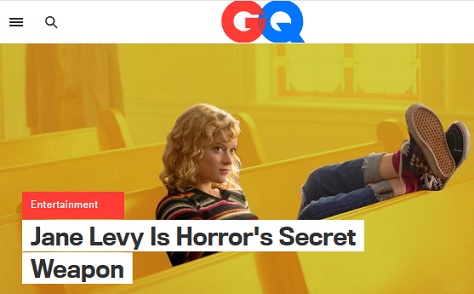 Jane Levy, currently appearing on Hulu's Stephen King-based anthology series Castle Rock, was interviewed a few days ago by GQ's Tom Philip. The conversation eventually turns to Carrie:
Jane Levy, currently appearing on Hulu's Stephen King-based anthology series Castle Rock, was interviewed a few days ago by GQ's Tom Philip. The conversation eventually turns to Carrie:Would you call yourself a King fan? Have you read a lot of his stuff?No, actually I had only read Carrie, and then I've also read his semi-memoir book, On Writing.
Oh, man, that's such a good book.
Isn't it? I loved reading that. He's also just really an endearing person. Interesting, good, smart obviously, extremely talented... Have you read a lot of his books? Are you a Stephen King fan?
I guess so. I guess I've read maybe like a dozen or so, here and there?
A dozen or so's a lot.
He's had, like, nearly a hundred!
That's true. I haven't read much Stephen King, but since working on this project I've learned a lot about him and I think he's a really cool guy and I'll obviously read more.
How about the movies, then? Did you have the shit scared out of you by Carrie when you were little or anything like that?
I read the book and that actually scared the shit out of me more when I was in high school. I guess I wouldn't say I was scared by the movie, but titillated might be more the word. And Sissy Spacek, like you said, a legend, is one of my favorite actresses of all time and her performance in that movie is just so radical and weird and scary. Did you see the Brian De Palma documentary, De Palma? There's a part about casting her.
No, actually. I must.
There's some story, I forget the exact details, that they already had another choice for Carrie. Sissy Spacek knew De Palma through friends, and was like begging him, "You have to just see me for this part." And he was like, "Okay, sure." But it was some sort of courtesy. He already had cast the part in his mind, but then Sissy read and he was like, "Whelp! Never mind! Nobody else could ever play this part. Here you go."
I'm also a big fan of The Shining, the movie, even though we all know that Stephen King has said that he's not that big of a fan of that one... I loved the It adaptation that came out last year. I thought that the movie wasn't scary, but I'm excited that they're making the second half. The one I want to see right now is Pet Sematary.
Oh that's going to fuck you up. Are there any other King adaptations you'd want to do? It seems like the universe is open to cross-casting, with Skarsgård and Spacek involved in Castle Rock.
Actually, I read a pilot by his son, Joe Hill, that I loved. I love the idea of the book that they wrote together about women. Isn't it called Sleeping Beauties?
Wasn't that with Owen King, his other son?
I guess I'm interested in all the King men.
You used the phrase "final girl" earlier, and I'm wondering how you feel about the terms like "final girl" and "scream queen." A lot of people would describe you in films like Don't Breathe as that. Do you feel tropes, or even the phrasing like that, is dated? Or are you cool with it?
I have a lot of thoughts about it. I wouldn't really know if I could compile a perfect answer for that, but actually I do think that there is something very cool about the final girl. Of course, I think that women have been exploited and women's sexuality has been exploited in horror films since the beginning, and that's a lot of what horror films are about. There's a lot that you could point out in horror films that is misogynistic and totally just like, male fantasy violence against women.
But at the same time I think that horror films have given female characters a platform that normal mainstream movies haven't necessarily, in certain ways. I think that women can be action heroes in horror films in ways that are not common in action films. That's cool! And a lot of times women in horror are presented with their worst fear and they step up to the plate.
So, I kind of like the term! I think that there's something, I don't know, culty and old school about it. I don't feel it's disrespectful. Horror fans show up for you. It's been kind of flattering in a funny way to have these strangers consider me, that I'm accepted into this world. It's so not what I expected out of my life, but I feel like I have this badge of honor.